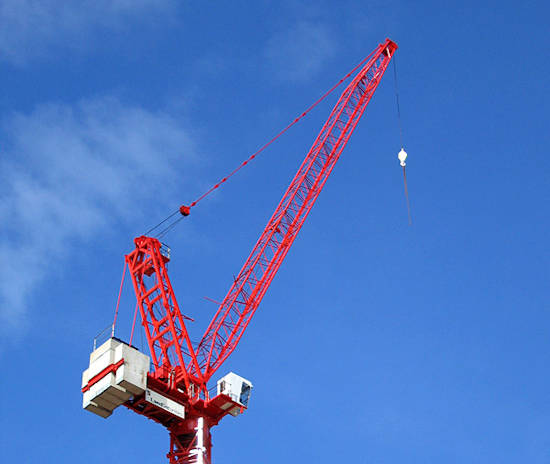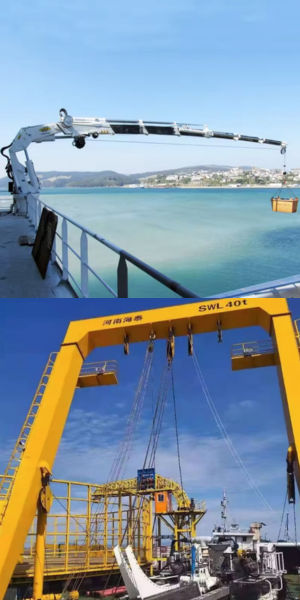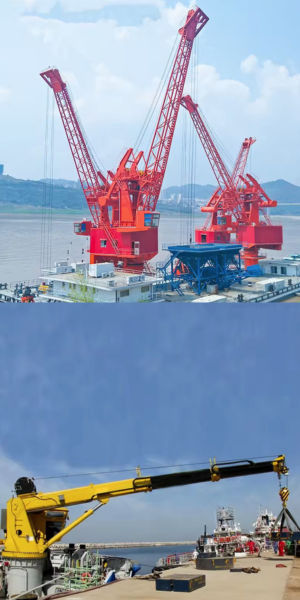Cost/Install on the 12 Most Common Marine Cranes

From the high-flying jib cranes to the mighty bulk handlers, each crane has its unique role to play in the bustling world of shipping and marine operations. Let’s dive in and check out 12 of the most common crane types you'll find on commercial vessels, along with a bit of what makes each one special, how much they might set you back, and how long they take to install. It's quite the lineup!
* Please send feedback/suggestions to editor @ shipuniverse.com

Factory Direct Pricing = Huge Savings
* High-end cranes trusted by top fleets.
* Fully customizable according to your specs.
* Marine cranes, including gantry, deck, knuckle boom, telescopic, and jib cranes, to meet all your maritime needs.
| Deck Crane | Gantry Crane | Overhead Crane | Container Carrier | Knuckle Boom |
|---|---|---|---|---|
| 10k to 80k | 20k to 50k | 30k to 60k | 40k to 70k | 15k to 40k |
- Telescopic Crane
- About it: These are the Swiss Army knives of cranes. They're super adaptable and can stretch out their booms like a telescope to reach various heights and lengths. You'll often see them doing all sorts of jobs on different ships.
- Rough Cost: It's a bit like asking how much a car costs – it varies a lot. But, for a ballpark, smaller models might start around $100,000, while larger, more advanced ones can hit a million bucks or more.
- How Long to Set Up?: Again, this depends on the crane's size and the ship. Typically, installing a medium-sized telescopic crane might take a couple of weeks to a month, considering all the setup, testing, and safety checks.
- Knuckle Boom Crane
- About it: Think of an elbow in a crane form. These guys can fold up, making them perfect for working in tight spaces where you can't just swing a big arm around. They're pretty popular on supply vessels and smaller cargo ships.
- Rough Cost: These cranes can be less expensive than telescopic ones. Smaller knuckle boom cranes might start around $50,000, with larger, more complex models going well into the hundreds of thousands.
- How Long to Set Up?: Installation is generally quicker than for telescopic cranes, but it still could take a few weeks, especially if custom modifications are needed for the ship.
- Lattice Boom Crane
- About it: These are the heavy lifters. With their lattice structure (like metal scaffolding), they're built for the tough stuff – think heavy cargo, construction tasks, that sort of thing. Not the most flexible, but when you need muscle, they're your cranes.
- Rough Cost: Lattice boom cranes can get pricey, mainly because they're built for heavy-duty work. Prices can range from several hundred thousand dollars to over a million for the really big ones.
- How Long to Set Up?: They're a bit more complex to set up, what with their hefty structure. You could be looking at one to two months for installation, depending on the crane size and ship modifications needed.
- Deck Crane
- About it: These are like the reliable workhorses of cargo ships. You'll see them hustling with containers or other cargo. Some have telescopic booms, others fold like knuckles – it's a mixed bag.
- Rough Cost: It's a bit like asking how much a house costs – it's all over the place. Small deck cranes can start around $50,000 or so, but beefier ones can easily climb into the hundreds of thousands.
- How Long to Set Up?: Generally, a few weeks should do it. Of course, if it's a complicated model or a quirky ship, it could take a bit longer, but usually not more than a month.
- Active Heave Compensation (AHC) Crane
- About it: Imagine trying to thread a needle on a bouncing bus. That's the kind of challenge these cranes handle. They're super high-tech, compensating for the ship's bouncing and rolling on the waves, making them ideal for tricky, precise jobs in choppy seas.
- Rough Cost: Okay, these are the Ferraris of ship cranes. Prices can start in the low millions and just go up, depending on size and capabilities.
- How Long to Set Up?: Given their complexity, you're looking at possibly a couple of months. There's a lot of calibration and testing to ensure they can handle the ocean's mood swings.
- Jib Crane
- About it: Jib cranes are like the swivel chairs of the crane world – they have a fixed spot but can turn around to handle different tasks. They're pretty versatile and great for things like loading cargo, maintenance work, and even fishing operations.
- Rough Cost: More on the affordable side, small jib cranes might start around $30,000 or so. As they get bigger and more complex, the price can jump up to a couple of hundred thousand.
- How Long to Set Up?: These are usually not too complex to install. A few weeks should be enough to get a jib crane up and running.
- Gantry Crane
- About it: Picture the big cranes you see at ports, straddling rows of containers. Now, imagine a smaller version on a ship. That's your onboard gantry crane. It's like a giant, moving doorframe that lifts and shuffles containers around.
- Rough Cost: Gantry cranes are big investments. For shipboard ones, think in terms of hundreds of thousands to possibly over a million dollars, depending on size and technology.
- Time to Set Up: It's like building a mini skyscraper on a ship. It can take several months, given the complexity and the need to integrate it well with the ship's structure.
- Travelling Jib Crane
- About it: These are the wanderers of the crane world. Mounted on tracks, they can travel the length or width of the ship, making them super handy for reaching different cargo areas. It’s like having a crane on a train track.
- Rough Cost: Pricing can be a bit varied, starting from the mid-hundreds of thousands and going up, depending on size and features.
- Time to Set Up: Installing a traveling system adds complexity, so you’re likely looking at a couple of months to get everything in place and running smoothly.
- Provision Crane
- About it: Think of these as the handy little helpers on a ship. They’re used for lifting food, spare parts, and other supplies – not the heavy stuff, more like the groceries and the mail.
- Rough Cost: These are more on the affordable side of ship cranes. Prices can range from as low as $20,000 to $50,000 or more, depending on their capacity and sophistication.
- Time to Set Up: They're relatively straightforward to install. A few weeks should generally be enough to get a provision crane ready to go.
- Bulk Handling Crane
- About it: Imagine a big claw machine, but instead of toys, it's grabbing tons of bulk cargo like coal or grain. That's your bulk handling crane. It's specially designed to scoop up and move loads of loose materials with its big grab buckets.
- Rough Cost: These cranes are specialized, so they're not cheap. Prices can range from a few hundred thousand dollars to well over a million, depending on their size and capabilities.
- Time to Set Up: Given their size and the intricacies of the grabbing mechanism, you're looking at a couple of months or more to get one of these fully operational.
- Barge Crane
- About it: Think of these as the multitaskers on the water. They're found on barges and used for all sorts of jobs – building bridges, dredging rivers, or even marine salvage operations. They come in various sizes, tailored to the task at hand.
- Rough Cost: A lot depends on their size and purpose. Smaller barge cranes might start in the low hundreds of thousands, while larger, more specialized ones can easily run into the millions.
- Time to Set Up: Installing a crane on a barge can be quite a project. Depending on the complexity, it could take several months, especially if you’re customizing the barge for specific tasks.
- Marine Pedestal Crane
- About it: These are like the watchtowers of the sea, mounted on a tall pedestal and used for heavy lifting in the oil and gas industry, among other maritime tasks. They're built tough to withstand harsh ocean conditions.
- Rough Cost: Given their robust design and heavy-duty nature, these cranes are a significant investment. Prices can start in the mid-hundreds of thousands and go way up, especially for the larger or more advanced models.
- Time to Set Up: It's a complex process to install one of these giants, so you're looking at a couple of months or more for installation and testing.
Click here to find your Ideal Marine Crane
And there you have it! A quick tour through the world of shipboard cranes. Each of these cranes, from the nimble provision cranes to the robust marine pedestal giants, is like a vital cog in the vast machinery of maritime operations. Whether lifting containers on a cargo ship or handling heavy equipment on an oil rig, these cranes are essential for keeping the wheels of global trade and industry turning. Just remember, the costs and installation times are ballpark figures – the real deal can vary. But one thing's for sure, whether big or small, each crane plays a pivotal role in the smooth sailing of the maritime world. Hope this helps you appreciate the mechanical marvels working on the high seas! 🚢🏗️🌊

Factory Direct Pricing = Huge Savings
* High-end cranes trusted by top fleets.
* Fully customizable according to your specs.
* Marine cranes, including gantry, deck, knuckle boom, telescopic, and jib cranes, to meet all your maritime needs.
| Deck Crane | Gantry Crane | Overhead Crane | Container Carrier | Knuckle Boom |
|---|---|---|---|---|
| 10k to 80k | 20k to 180k | 3k to 10k | 100k to 260k | 15k to 100k |
Suppliers
- Liebherr
- Overview: Liebherr is a globally recognized company known for a wide range of products, including high-quality marine cranes. They offer an extensive selection, from ship cranes and mobile harbor cranes to offshore cranes.
- MacGregor
- Overview: Part of Cargotec, MacGregor specializes in engineering solutions and services for handling marine cargoes and offshore loads. They are well-known for their advanced crane designs tailored to various maritime needs.
- Konecranes
- Overview: Konecranes is a major player in the global market for lifting equipment, including marine cranes. They are known for their technological innovations and provide equipment for cargo handling and shipyard operations.
- PALFINGER Marine
- Overview: PALFINGER is renowned for its comprehensive range of marine cranes, designed for various applications in the maritime sector. Their cranes are known for their durability and reliability in harsh sea conditions.
- TTS Group
- Overview: TTS Group is an international corporation that designs, develops, and supplies equipment for the maritime and offshore industries. They offer a range of marine cranes suited for different types of vessels and operational requirements.
- Huisman Equipment
- Overview: Huisman is a global supplier known for producing heavy lifting, drilling, and subsea equipment, including innovative marine cranes. They are recognized for their custom-built designs and engineering prowess.

Do you have a Maritime Product or Service that may be of interest to Shipowners? Tell us about it here!
Do you have feedback or insights? Please reach out to editor @ shipuniverse.com



